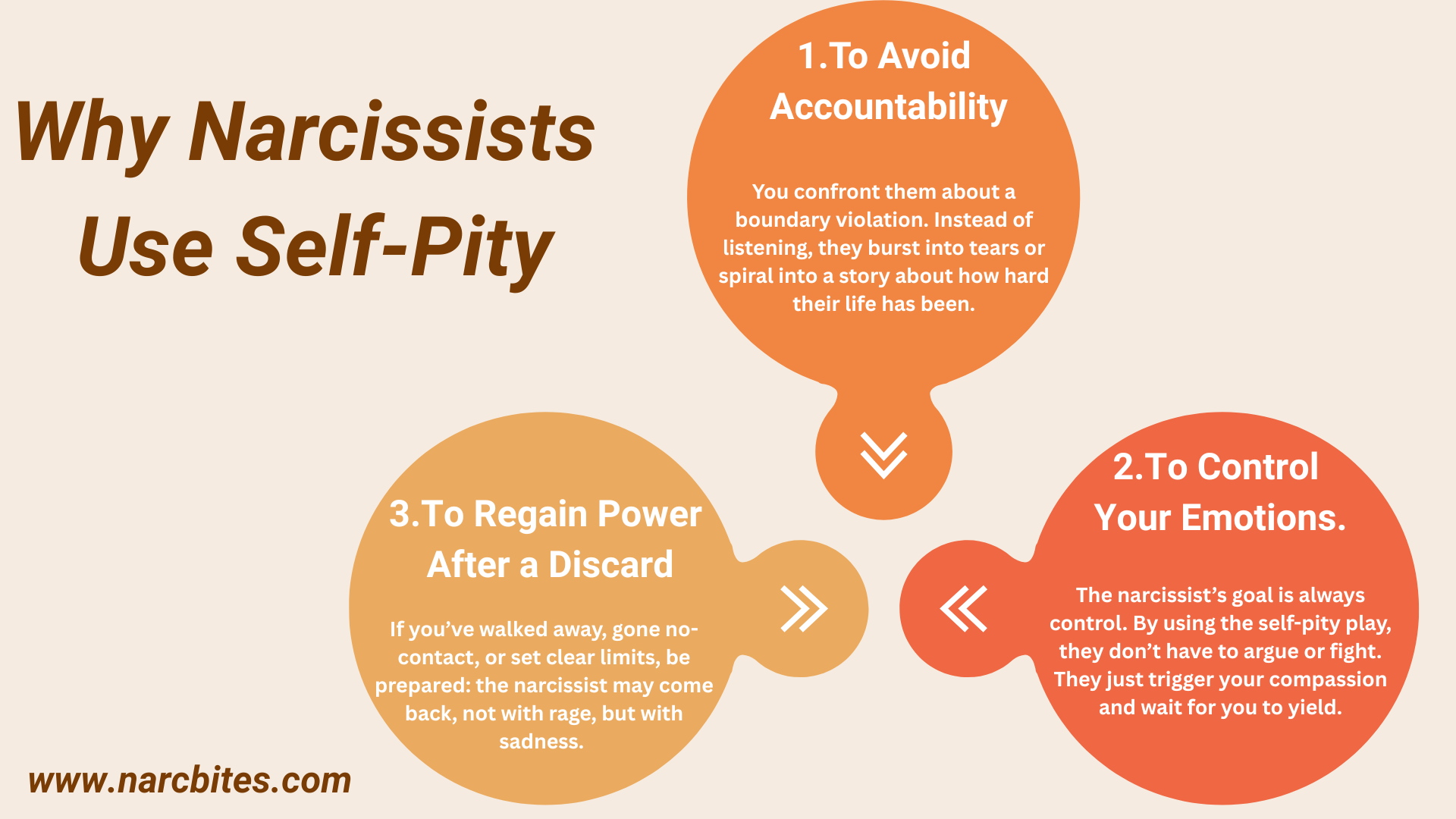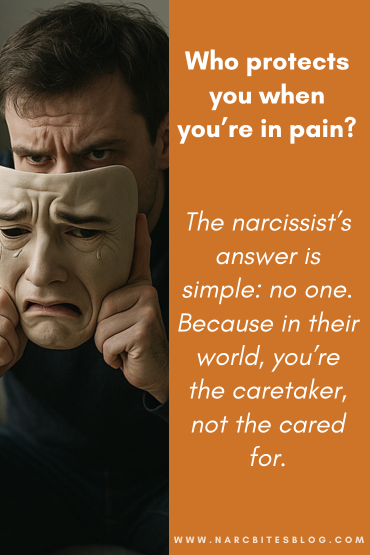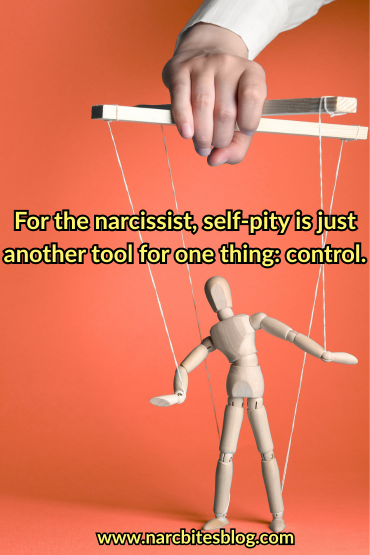When a narcissist feels like they’re about to lose their reliable supply, they get scared. Because they haven’t gotten everything they need from you yet. You still admire them, still revolve around them, maybe even support them financially, since once again they’re conveniently out of a job. Their last boss was an idiot, just like all the others, so of course they had no choice but to quit.
That’s pity manipulation. The narcissist is playing on your empathy. They know exactly what to say, when to say it, and how to say it so that things go their way. Again. Because just like everything else they do, this too is about keeping control.
What Is a Self-Pity Play?
When we think of narcissists, we tend to imagine loud, arrogant show-offs who dominate every conversation and always need to be the center of attention. And sure, that’s often true. But some of their manipulation tactics are way more subtle. One of them is playing the victim. This is what’s often called the self-pity play, and it’s hard to guard against, because it targets your empathy. The very quality that might be the reason the narcissist picked you in the first place.
It’s when the narcissist says things like, “Remember when I told you my mom didn’t speak to me for three months?” Or, “I loved my godmother so much but she always picked up my brother instead of me.” Or maybe it’s something like, “I’m so drained from work. No one else does anything, and honestly, they’re all just idiots.” At first, you find yourself getting angry at their family, their boss, the people who hurt this poor soul.

That’s the point. The self-pity play is all about painting themselves as the victim to win your sympathy, dodge accountability, and manipulate others into giving them what they want. It’s basically a well-rehearsed performance designed to disarm your defenses.
They may recount childhood traumas, past betrayals, and endless stories of being misunderstood. And you, being the compassionate human you are, feel compelled to comfort them, to stay, to forgive. But here’s the trap. Their pain is real, but their use of it is tactical.
And no, it’s not just you. They use this on others too. In fact, they often use it against you, when they present you to their flying monkeys or next source of supply as selfish and abusive. And those people start to hate you just like you once hated the narcissist’s horrible family or their cruel boss.
Why Narcissists Use Self-Pity

1. To Avoid Accountability
When you confront them about something awful they did, instead of apologizing or trying to make things right, they start crying halfway through your sentence or launch into a tragic story about how hard their life has been. And suddenly, you find yourself shifting from being the one hurt to the one offering comfort. Just like that, the original issue disappears.
This is a very subtle form of emotional blackmail. You feel like you have to stay quiet, because you don’t want to add to their pain. You don’t want to make them feel worse. They already have enough going on. And just like that, they’ve escaped the consequences. The conversation stops being about what they did to you and turns into one about their suffering.
2. To Control Your Emotions
let’s be honest, that’s always the narcissist’s goal. The self-pity play lets them avoid confrontation or conflict. No fighting, no yelling. Just enough sadness to trigger your compassion and wait for the storm to pass.
3. To Regain Power After a Discard
There’s another key moment in the narcissistic abuse cycle when they might pull out the pity card. It’s when you’ve finally had the strength to leave them, or when they left you and now regret it because they realize you still have something left they can use. That’s when the hoovering starts.
This time, the narcissist doesn’t come back in full force. No love bombing. Instead, they show up looking sad, defeated. Suddenly, they say they’re going to therapy. That they’re trying to change. You might hear things like, “You know I’ve always loved you” or “I can’t live without you, I miss you so much.”
And just like that, they shift from predator to victim, and you become their savior all over again.
The Psychology Behind the Self-Pity Play
If you’re wondering why this self-pity play works so well, we have to take a deeper look at the psychology behind it.
Narcissistic manipulation tactics rely on creating confusion between what’s real and what’s performed. The self-pity play is effective because it taps into a deep social script. We help those who suffer.
For someone with a healthy mindset, empathy is automatic. We don’t want to hurt others. When we see someone suffering, we want to help. Narcissists know this. They build a victim narrative and play the part of the one who’s always been wronged.
This tactic works especially well on people who are naturally caring, emotionally vulnerable, or who have their own history of trauma. If you grew up being the parentified child, or were abandoned, or had to be the peacekeeper during your parents’ constant fighting, you’re far more likely to fall for this performance again and again.

When a narcissist uses pity against you, it doesn’t feel like control. But it is. They don’t force you to do anything, but somehow they get their way. They condition you. You could even say they train you, like a dog fetching the ball. Every time they hurt you, they pull out one of their favorite manipulation cards—like self-pity—and keep playing it until you learn the “correct” response for that situation.
Meanwhile, you start believing you’re just being empathic, considerate, kind. That you have no right to say anything. No right to set boundaries. You start to wonder if maybe you were too harsh. Maybe you reopened old wounds.
And when they really feel the heat, they might start broadcasting their pain outward. Telling friends, posting cryptic updates on social media. That way, they turn others against you by casting themselves as the broken one. That poor soul who did everything they could. Right?
Now it’s not just the narcissist manipulating you. The entire circle around you starts applying indirect pressure. Anything you do that doesn’t align with the narcissist’s interests suddenly paints you as the bad guy.
And if you try to leave them? Some narcissists will even fake illnesses—mental or physical—to create deeper concern and keep you close. Because leaving them now would be cruel, right? You won’t do it. And they know that.
Behind all this manipulative, pity-inducing communication is one unspoken expectation. That your needs must always come second to theirs. You’re never allowed to be the most important person. Not even to yourself.
Fair question. So how do you tell the difference between genuine vulnerability and narcissistic self-pity?
Recognizing the Signs
It’s not always easy, but there are signs to watch for.
- Timing is everything. If their sudden vulnerability pops up right after you set a boundary or say no, that’s a red flag.
- Another clue is the pattern. Somehow, in every story they tell, they’re always the victim. Every ex was a monster. Every boss a tyrant.
- When you try to hold them accountable, the emotional outbursts derail the conversation completely.
- They never seem to take responsibility for anything. It’s always someone else’s fault. The boss. The ex. You. The universe.
- And when they do apologize, it sounds like, “I’m sorry, don’t be mad, but you kind of brought this out in me.”
- They rarely change their behavior, no matter how many times they promise they will.
- And if something about their emotional breakdown feels off—exaggerated, theatrical, or just fake—it probably is.
Trauma Bonding and the Cycle of Guilt

Besides your empathy, there’s one more thing keeping you stuck in this cycle. It’s the trauma bond.
The emotional rollercoaster of abuse, apology, pity, and reconnection creates a biochemical dependency. Your nervous system starts linking pain with love.
When the narcissist plays the victim, your brain floods with oxytocin, the bonding hormone. You feel like you deeply understand them. Like you’ve lived what they’ve lived. Even if you haven’t, it feels like you have. You slip into protector mode. You start thinking the whole world is against them, so you can’t possibly kick them while they’re down.
And boom—there’s the guilt.
That’s how trauma bonding works. The contradictions make it stronger. When someone hurts you and then looks broken, your instincts don’t scream run. They whisper stay and take care of them.
But once the storm passes, you might find yourself asking—who comforts you when you’re sad? Who protects you when you’re hurting?
No one. Certainly not the narcissist. In their world, you’re the caregiver. Never the one who’s cared for.
And if you ever dare to challenge their version of the story, expect to be punished. Maybe not right away, but eventually, you’ll feel it. And you’ll know exactly why.
Emotional Abuse Disguised as Suffering
They’ll accuse you of being selfish, cold, and heartless.
That’s projection. Another classic narcissistic tactic. They accuse you of the very things they’ve done. They dump their shame onto you, then sit back and watch you scramble to prove them wrong. So in the end, self-pity is just another form of emotional abuse, dressed up as suffering.
That’s what makes it so hard to spot. Because when someone is sitting in front of you sobbing, falling apart, the last thing you think is that you’re being abused. But you are.
And the next thing you know, you’re the one apologizing. For having dared to bring something up. For speaking about your pain. And somehow, the narcissist is the one crying, while you’re busy comforting them, whispering that it’s all understandable, they’ve just been through so much, and they didn’t mean to hurt you.
Everyone has hard moments, but if someone only shows their pain when it helps them avoid consequences, you can be sure you’re just sitting in a movie theater, watching the narcissist’s performance play out on screen.
The time has come to tend to your own emotional well-being

